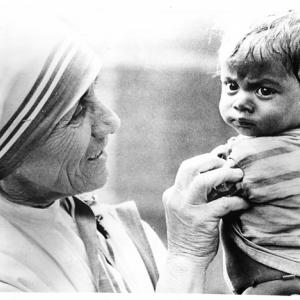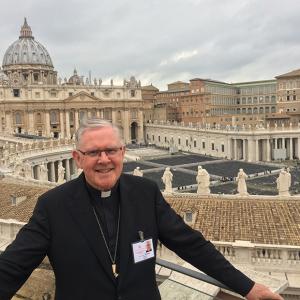David Gibson is an award-winning religion journalist, author, filmmaker, and a convert to Catholicism. He came by all those vocations by accident, or Providence, during a longer-than-expected sojourn in Rome in the 1980s.
Gibson began his journalistic career as a walk-on sports editor and columnist at The International Courier, a tiny daily in Rome serving Italy's English-language community. He then found work as a newscaster across the Tiber at Vatican Radio, an entity he sees as a cross between NPR and Armed Forces Radio for the pope. The Jesuits who ran the radio were charitable enough to hire Gibson even though he had no radio background, could not pronounce the name "Karol Wojtyla" (go ahead -- try it) and wasn't Catholic --- at the time.
When Gibson returned to the United States in 1990 he returned to print journalism to cover the religion beat in his native New Jersey for two dailies and to write for leading magazines and newspapers in the New York area. Among other journalism prizes, Gibson has won the Templeton Religion Reporter of the Year Award, the top honor for journalists covering religion in the secular press, and has twice won the top prize writing on religion from the American Academy of Religion.
Gibson currently writes for Religion News Service and until recently was covering the religion beat for AOL's Politics Daily. He blogs at Commonweal magazine, and has written two books on Catholic topics, the latest a biography of Pope Benedict XVI. He would like to write another -- but can’t seem to find the time.
He has co-written documentaries on early Christian and Jewish history for CNN, and recently worked on a March 2011 History Channel special on the Vatican. He currently has several other film projects in development. Gibson has written for leading newspapers and magazines, including The New York Times, Newsweek, The Wall Street Journal, New York magazine, Boston magazine, Fortune, Commonweal, America and, yes, The Ladies Home Journal.
Gibson is a longtime member of the Religion Newswriters Association. He and his wife and daughter live in Brooklyn.
Posts By This Author
Pope Francis Opts for Honey Over Vinegar in Curia Address. But Will It Work?
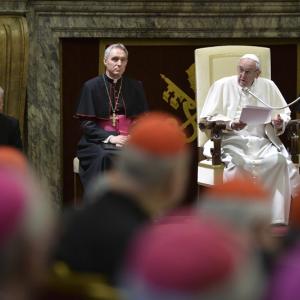
Image via REUTERS / Alberto Pizzoli / Pool / RNS
A year after he delivered a blistering diagnosis of 15 “diseases” plaguing the Roman Curia, including “spiritual Alzheimer’s,” Pope Francis on Dec. 21 listed a 12-point “catalog of needed virtues” that the bishops and cardinals who run the Holy See should seek to follow.
Mother Teresa Sainthood Set for September
Pope Francis has given final clearance for Mother Teresa — called “the saint of the gutters” for her work with the poor in India — to become an official saint, a move welcomed by the archbishop of Calcutta as “a real Christmas gift” from the pontiff.
Francis took the step by signing a decree declaring that the inexplicable 2008 recovery of a Brazilian man who suddenly woke from a coma caused by a viral brain infection was due to the intercession of the Albanian nun, who died in 1997.
Detroit Archbishop Denounces Proposals to Bar Muslims From U.S.
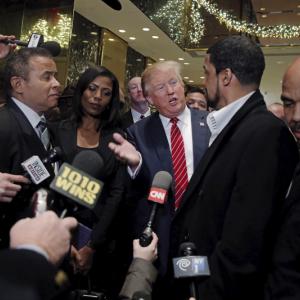
Image via REUTERS / Lucas Jackson / RNS
Without mentioning Republican presidential candidate Donald Trump by name, Detroit Archbishop Allen Vigneron has blasted proposals like Trump’s that would specifically bar Muslims from the U.S., saying the idea “fractures the very foundation of morality on which we stand.”
Vigneron’s denunciation, in a letter he sent on Dec. 10 to his priests, is significant because Catholic leaders have been strong defenders of religious freedom in recent years but have been largely quiet in the wake of Trump’s controversial pitch earlier this week to bar all Muslims from the U.S.
“While the Catholic Church refrains from weighing in for or against individual candidates for a particular political office, the Church does and should speak to the morality of this important and far-reaching issue of religious liberty,” Vigneron wrote in the letter, which he also sent to imams in his state.
Animal Images on St. Peter's Basilica Charm and Alarm
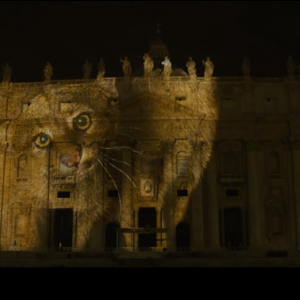
Screenshot via vatican / Youtube
An extraordinary illuminated projection of images of the natural world onto St. Peter’s Basilica on the evening of Dec. 8 drew thousands of awed spectators to the Vatican and delighted untold numbers more watching online and via widespread media coverage of the three-hour show.
But not everyone was happy with the spectacle, not by a long shot, as social media and conservative Catholic sites erupted with indignation.
“This has gone beyond ridiculous,” fumed a conservative blogger, the Rev. John Zuhlsdorf, who called it “irreverent” to use a sacred space for a secular purpose.
“Why not rent out the Sistine chapel too, while they’re at it?”
Catholic Diocese of Duluth Latest to File for Bankruptcy Over Sex Abuse Payouts
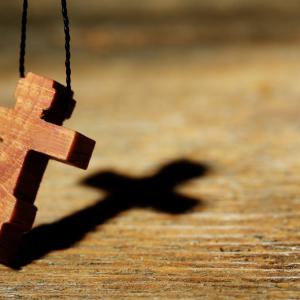
Image via Africa Studio / Shutterstock.com
The Roman Catholic Diocese of Duluth announced on Dec. 7 that it had filed for bankruptcy protection following a jury verdict last month that held the Minnesota diocese responsible for more than half of an $8.1 million judgment on behalf of a victim of sex abuse by a priest.
The Chapter 11 filing makes Duluth the 13th of nearly 200 U.S. Catholic dioceses to file for bankruptcy since 2004 because of the clergy sex abuse scandals. Regional organizations of two religious orders have also sought bankruptcy protection.
The Duluth award was one of the highest single monetary compensations for a survivor of clergy abuse, experts said. It was made possible thanks to a Minnesota law that lifted the statute of limitations on civil claims for sex abuse.
Did Pope Francis Say Lutherans Can Take Communion at Catholic Mass?
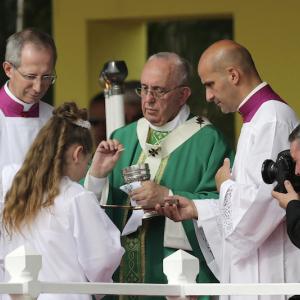
Image via Claudia Daut / REUTERS / RNS
Pope Francis has a knack for setting traditionalist teeth on edge with unscripted musings on sacred topics. He recently did it again when he seemed to suggest that a Lutheran could receive Communion in the Catholic Church after consulting her conscience.
The exchange came up during a prayer service Nov. 15 at a Lutheran church in Rome that had invited the pontiff. And he used the occasion to engage in a question-and-answer session with some of the congregants.
One woman, Anke de Bernardinis, told Francis that she was married to a Catholic and that she and her husband share many “joys and sorrows” in life, but not Communion at church.
“What can we do on this point to finally attain Communion?” she asked.
'Francis Effect' Only Goes So Far With Bishops' Revised Voter Guide
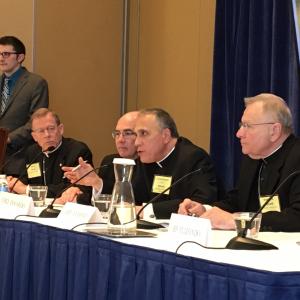
Image via David Gibson / RNS
The nation’s Catholic bishops on Nov. 17 passed an updated guide for Catholic voters ahead of next year’s elections, but only after airing unusually sharp disagreements on how much they can, and should, adjust their priorities to match those of Pope Francis.
More than any other item on the agenda of the bishops’ annual meeting here, the debate over the lengthy voter guide, called “Faithful Citizenship,” revealed deep divides among the bishops and provided a snapshot of the extent of the “Francis effect” on the U.S. hierarchy.
In the most impassioned objection to the voter guide, San Diego Bishop Robert McElroy took the floor to argue that the document — which was a reworking of an 84-page treatise first written in 2007 — should be scrapped because it did not reflect the way that Francis has elevated the battle against poverty and for the environment as central concerns for the Catholic Church since his election in 2013.
Pope Francis Expected to Visit U.S.-Mexico Border in February, Adviser Says
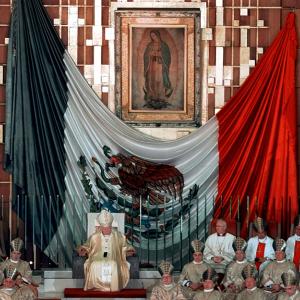
Pope St. John Paul II during Mass in Mexico City in 1999. Image via REUTERS / RNS
A Honduran cardinal who is a top adviser to Pope Francis said he expects the pontiff to travel to Mexico’s border with the U.S. when he visits that country in February.
“I think it’s almost sure he will go to the border. I don’t know which cities,” said Cardinal Oscar Rodriguez Maradiaga, who heads a special council of nine cardinals that Francis set up in 2013 to advise him on reforming the Vatican.
“Knowing him, he will go … I don’t know yet where,” Rodriguez said in an interview on Nov. 3 before taking part in a Fordham University panel on “Laudato Si’,” the pope’s groundbreaking encyclical on the moral duty to protect the environment.
Pope Francis 'Prepared to Battle' on Vatican Reform, Senior Cardinal Says
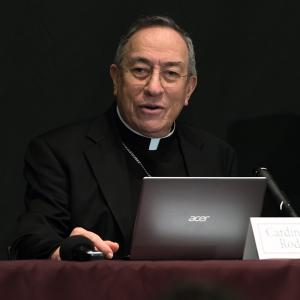
Cardinal Oscar Rodriguez Maradiaga. Image via Leo Sorel / Fordham University / RNS
Despite intense opposition from some conservatives and new revelations of financial scandals in the Vatican, Pope Francis is at peace with the reformist course he has set for the Catholic Church, according to a cardinal who is a leading adviser to the pontiff.
Honduran Cardinal Oscar Rodriguez Maradiaga also said that the latest reports of excessive spending and political maneuvering by officials of the Roman Curia only confirm the need to press ahead with an overhaul of the papal bureaucracy.
“You know, everybody that is trying to make good will have opposition,” Rodriguez said Nov. 3 after a conference at Fordham University on Francis’ environmental agenda.
Secret 'Catacombs Pact' Emerges After 50 Years, and Pope Francis Gives It New Life

Image via Grant Gallicho / RNS
The document would become known as the Pact of the Catacombs, and the signers hoped it would mark a turning point in church history.
Instead, the Pact of the Catacombs disappeared, for all intents and purposes.
It is barely mentioned in the extensive histories of Vatican II, and while copies of the text are in circulation, no one knows what happened to the original document. In addition, the exact number and names of the original signers is in dispute, though it is believed that only one still survives: Luigi Bettazzi, nearly 92 years old now, bishop emeritus of the Italian diocese of Ivrea.
Cardinal Wuerl: Catholic Church Moving From Legalism to Mercy
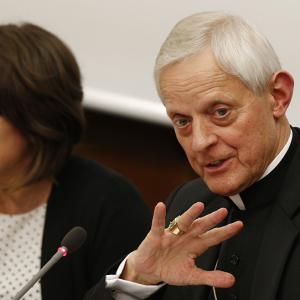
Cardinal Donald Wuerl. Image via Paul Haring / Catholic News Service / RNS
“The frame of reference is now going to be: ‘What does the gospel really say here?’ That’s our first task.”
That’s Washington Cardinal Donald Wuerl summing up the new course for Catholicism set by the momentous Vatican meeting of 270 bishops from around the world that concluded last weekend, a three-week marathon in which he played a key role.
After often contentious talks on whether to adapt the church’s approach to issues such as divorce and cohabitation, the high-level synod succeeded in giving Pope Francis a document that offers him significant new flexibility in shaping more pastoral policies.
Who Won? Who Lost? 5 Points on the Contentious Vatican Summit
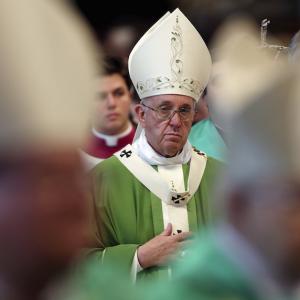
Image via Alessandro Bianchi / REUTERS / RNS
The most significant and contested gathering of Roman Catholic bishops in the last 50 years formally ended on Oct. 25 after three weeks of debate and dispute, but the arguments over who “won” and who “lost” are only beginning.
The synod of 270 cardinals and bishops from around the world was the second in a year called by Pope Francis to address how and whether Catholicism could adapt its teachings to the changing realities of modern family life. Traditionalists had taken a hard line against any openings, especially after last October’s meeting seemed to point toward possible reforms.
While the delegates made hundreds of suggestions on a host of issues, two took center stage, in part because they represented a barometer for the whole question of change: Could the church be more welcoming to gays, and was there a way divorced and remarried Catholics could receive Communion without an annulment?
Vatican Synod's Language Games Will Have Real-Life Consequences
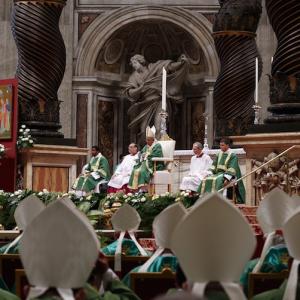
Image via Alessandro Bianchi / REUTERS / RNS
The overriding interest in the global meeting of Roman Catholic bishops that finishes here on Oct. 25 has centered on whether the churchmen will actually do anything in the end — as in vote to make changes in church doctrines or policies — or leave well enough alone.
In reality, the gathering of 270 bishops from around the world, called a synod, has no authority to legislate doctrinal or other changes, and wasn’t expected to try anything that bold anyway.
Its real purpose — thanks to reforms instituted by Pope Francis — is to discuss issues openly and frankly, and to advise the pontiff about what they think the church ought to do about the challenges facing families today, or, as is likely the case for this divided synod, to kick the hard questions upstairs for him to decide.
The 'Blogging Bishop of Brisbane' Dishes on the Real Story of the Vatican Synod
Barrels of ink, digital and real, have been spilled by journalists trying to convey the gravity of the high-stakes debate on church teaching in Rome this month, as the melodrama that a closed-door Vatican gathering of some 270 churchmen almost guarantees.
The synod, as it’s called, has it all: steady leaks to the press, rumors of lavish dinners and reports of intense lobbying, plus open disagreements over doctrine. It’s a steady diet of soap opera and theology, and almost too much for any reporter to keep up with.
Which is why, if you want to know what it’s like to be a player in such an event, and in the extracurricular socializing where much of the work is done, you have to read the blog of Australian Archbishop Mark Coleridge.
Clash of the Archbishops: Synod Dispute Between U.S. Senior Churchmen Goes Public
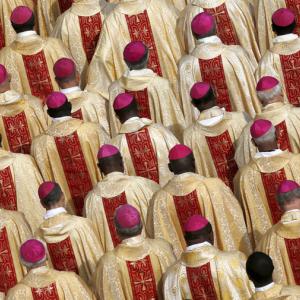
Image via Alessandro Bianchi / REUTERS / RNS
The eight American bishops taking part in a Vatican summit on family life stay at a huge seminary built high on a hill overlooking St. Peter’s Basilica and the rest of the Eternal City.
It’s a lovely place with spacious apartments for each bishop and any amenity they might need.
But for all that, it may be getting a tad uncomfortable.
In the latest installment of an increasingly sharp exchange conducted via the media, Philadelphia Archbishop Charles Chaput on Oct. 19 rejected what he took as a swipe at him by Washington Cardinal Donald Wuerl, also a member of the U.S. delegation at this gathering of global bishops.
African Bishops Play a Major Role, for First Time, at Contentious Vatican Summit
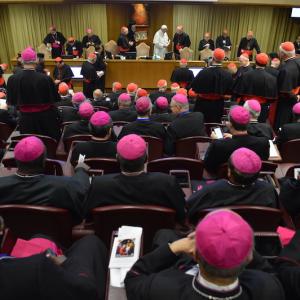
Image via Rosie Scammell / RNS
The morning prayer that starts each session of a major gathering of Catholic churchmen underway here is an important chance for the 270 cardinals and bishops from around the world to set a meditative tone for what are contentious debates about church teachings on sexuality and family life.
With Pope Francis leading the way, the prelates seated in a large Vatican lecture hall chant the traditional Latin prayers pausing near the end for a brief reflection on the day’s Scripture by one of the bishops at the meeting, known as a synod.
Yet even that moment of spiritual peace is not always a sanctuary from the tensions roiling the three-week meeting that ends Oct. 25.
N.J. Archbishop Sets Rules for Barring Catholics From Communion
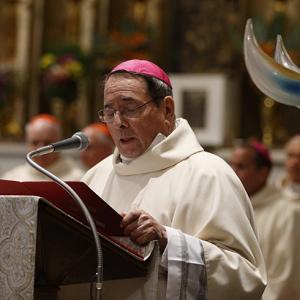
Archbishop John J. Myers. Image via Paul Haring / Catholic News Service / RNS
Even as Pope Francis and Catholic leaders from around the world debate ways to make the Catholic Church more inclusive, Newark Archbishop John Myers has given his priests strict guidelines on refusing Communion to Catholics who, for example, support gay marriage or whose own marriage is not valid in the eyes of the church.
In the two-page memo, Myers also orders parishes and Catholic institutions not to host people or organizations that disagree with church teachings.
He says Catholics, “especially ministers and others who represent the Church, should not participate in or be present at religious events or events intended to endorse or support those who reject or ignore Church teaching and Canon Law.”
Chicago Archbishop Calls for Tough Gun Control Laws
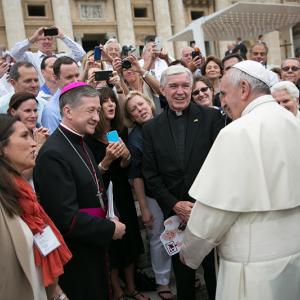
Blaise Cupich with Pope Francis. Image via Rich Kalonick / RNS
Archbishop Blase Cupich of Chicago, named by Pope Francis to that high-profile post a year ago, has issued a powerful call for tougher gun control laws in a move that may push the volatile issue further up the Catholic hierarchy’s agenda than it has been before.
The original intent of the Constitution’s right to bear arms has been “perverted” by a gun industry that is seeking profits at any cost, Cupich wrote in an op-ed in the Chicago Tribune. The founding fathers could not have anticipated the widespread availability of “military-grade assault weapons that have turned our streets into battlefields.”
“It is no longer enough for those of us involved in civic leadership and pastoral care to comfort the bereaved and bewildered families of victims of gun violence,” he wrote in the column, which was published Oct. 9.
“We must band together to call for gun-control legislation,” he concluded.
Ordain Women? Vatican Synod Gets an Unexpected Proposal
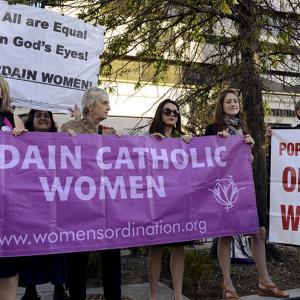
Image via Mike Theiler / REUTERS / RNS
The most controversial proposal floated so far at the high-level, high-stakes Vatican summit on church teachings on the family had nothing to do with gays or divorce, but instead ordaining women — not as priests, but as deacons.
Still, even that suggestion — made by a Canadian archbishop on Oct. 6, near the start of the closely watched, three-week synod called by Pope Francis — was considered eye-popping.
That’s because if the trial balloon floated by Quebec Archbishop Paul-Andre Durocher flies, it would represent a historic breakthrough for the Catholic Church, and Catholic women, by giving them access to the kinds of offices that only priests and bishops can hold.
No Rest for a Weary Pope: Francis Now Faces a Bigger Test Than U.S. Trip
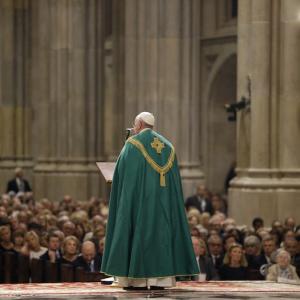
Image via Mary Altaffer / REUTERS / RNS
Pope Francis returned to Rome Sept. 28 after the longest and perhaps most challenging foreign journey of his pontificate: a trip that lasted 10 days and took him from the communist outpost of Cuba to the capitalist superpower of the U.S., where the popular pontiff faced some of his toughest critics — both inside and outside the church.
Now comes the hard part.
On Oct. 4 in the Vatican, Francis formally opens a three-week meeting of some 270 bishops from around the world who will discuss — or, more likely, argue vociferously about — church teachings on family life, a topic that encompasses hot-button questions about the church’s views on divorce, homosexuality, and cohabitation.
